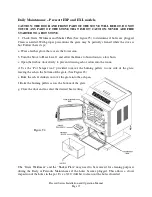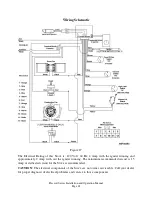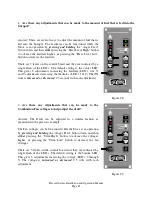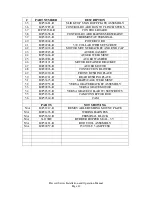
Prescott Series Installation and Operation Manual
Page 35
WARNING: The Insert has been Safety Tested by an accredited, independent
laboratory.
These safety features are designed to protect life and property. Bypassing
these features voids all warranties and the safety listing of the Prescott EXP and EXL.
There is a 60 second delay before the unit shuts down to allow for cleaning the glass before then
Vacuum switch shuts the stove down. This is sufficient for the Daily Maintenance
3.
Proof of Fire switch
also called the
P.O.F.
This senses the temperature rise in the
exhaust system. The switch is “Normally Open” and closes the circuit at 110 degrees. The Stove
will shut down if temperatures above 110 degrees F are not sensed during start up or if the
temperature drops below 110 degrees during normal operation.
4.
Hopper Lid Switch.
The hopper lid switch will shut off the auger motor when the
hopper lid is open. Be sure the lid closes completely when refilling the hopper or the unit will
shut down
Prescott EXP and EXL Maintenance
NOTE: WHEN YOU FIRST OPERATE THE STOVE, CHECK TO DETERMINE
THE FREQUENCY OF CLEANING. THE STOVE REQUIRES A MINIMUM
AMOUNT OF DAILY MAINTENANCE. REQUIRED MAINTENANCE DEPENDS
LARGELY UPON THE QUALITY OF FUEL BURNED AND THE RATE OF BURN.
THE AMOUNT OF DAILY MAINTENANCE WILL INCREASE IF FUEL QUALITY
DECREASES AND/OR THE BURNING RATE OF THE FUEL INCREASES.
NOTE: FAILURE TO KEEP YOUR STOVE CLEAN, AS DESCRIBED IN THIS
MANUAL, COULD RESULT IN POOR OPERATION, INEFFICIENT FUEL USAGE
AND A POSSIBLE SAFETY HAZARD! IT IS THE RESPONSIBILITY OF THE
OWNER/USER TO DETERMINE THE NEEDED MAINTENANCE FREQUENCY.
CAUTION: THE DOOR AND FRONT PART OF THE STOVE WILL BE HOT. DO
NOT TOUCH ANY PART OF THE UNIT THAT IS HOT!
NOTE: FAILURE TO KEEP YOUR STOVE CLEAN, AS DESCRIBED IN THIS
MANUAL, COULD RESULT IN POOR OPERATION, INEFFICIENT FUEL USAGE
AND A POSSIBLE SAFETY HAZARD! IT IS YOUR RESPONSIBILITY TO DETER-
MINE THE MAINTENANCE FREQUENCY.
MAINTAINING THE STOVE -
The stove requires a minimum amount of daily maintenance.
Required maintenance depends largely upon the quality of pellet fuel burned and the rate of burn.
The amount of daily maintenance will increase if fuel quality decreases and/or the burning rate
of pellets increases.
















































